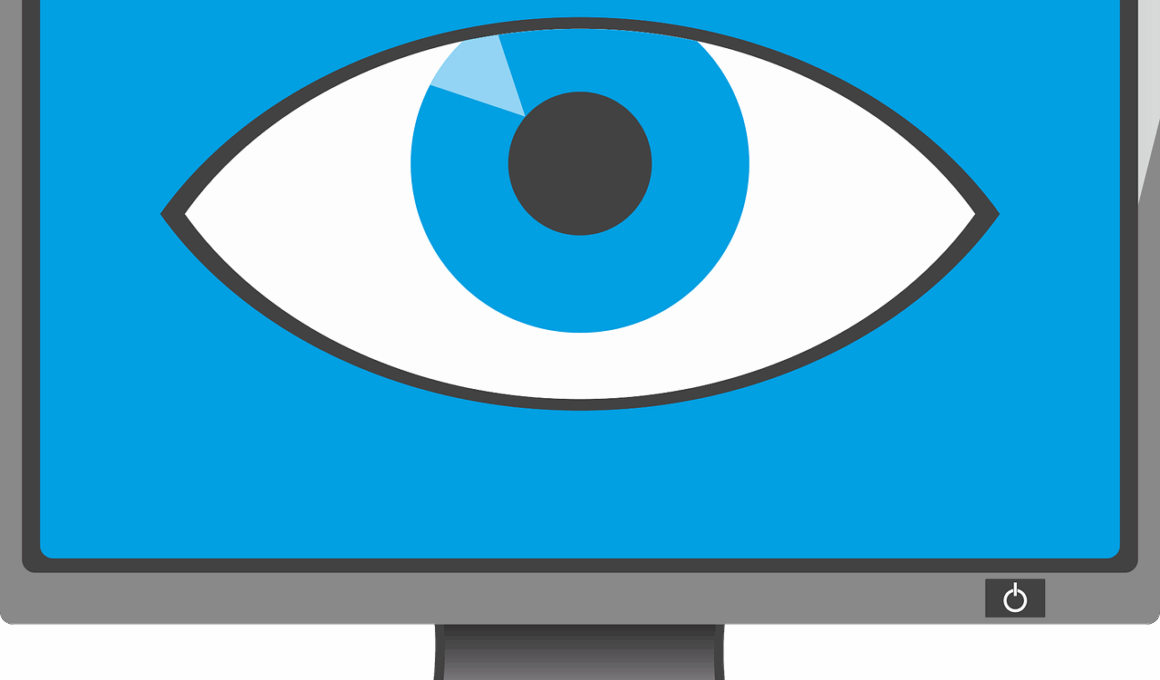The Ethics of Monitoring Employee Online Activity
As organizations increasingly leverage social media platforms, the ethics of monitoring employee online activity emerges as a complex issue. Employers often justify surveillance as a necessary means to protect their brand and ensure compliance with company policies. However, employees have legitimate expectations of privacy, even in a digital world that blurs professional and personal boundaries. Hence, a delicate balance must be struck between an organization’s right to monitor and an employee’s autonomy. Employers should first establish clear policies regarding monitoring practices, communicating them transparently to staff. Such policies can help ensure that employees are aware of the extent and purpose of monitoring, fostering a culture of trust. Additionally, organizations must adhere strictly to relevant laws and regulations that govern privacy and surveillance. While protecting the company’s interests is important, legal compliance is essential to avoid potential lawsuits and reputational damage. The key is to use monitoring tools responsibly, ensuring that they respect the dignity and rights of employees. Ultimately, an ethical approach should promote transparency and accountability, aligning monitoring practices with broader organizational values.
In addition, ethical considerations surrounding employee monitoring also include the potential psychological impact on staff morale. Employees who feel they are constantly surveilled may experience heightened stress levels, negatively impacting job satisfaction and productivity. This leads to a paradox where monitoring intended to enhance security may actually undermine staff well-being. To address these issues, organizations must promote open lines of communication and encourage feedback regarding monitoring practices. Regular discussions can illuminate employee concerns and perceptions, helping to refine policies in ways that respect privacy while still achieving security goals. Moreover, training for both management and employees on ethical surveillance practices can play a critical role. Education can help all parties understand the implications of monitoring, fostering a workplace environment rooted in mutual respect. When addressing sensitive topics like employee monitoring, it is crucial to engage stakeholders from throughout the organization. Establishing a collaborative dialogue ensures that various perspectives are considered, leading to more effective monitoring strategies. Promoting ethical monitoring not only safeguards the organization but also cultivates a positive company culture where employees feel valued and respected.
Understanding Legal Frameworks
The legal frameworks surrounding employee monitoring vary significantly depending on jurisdiction, thus complicating the ethical landscape. Organizations must familiarize themselves with local, national, and international regulations governing privacy rights and data protection. For instance, the European Union’s General Data Protection Regulation (GDPR) imposes strict conditions on data collection, necessitating transparency and legitimate purpose for monitoring. Failure to comply can result in hefty fines and legal action, emphasizing the importance of integrating compliance into monitoring policies. In contrast, certain regions may have more lenient or undefined regulations, leaving employers to navigate the murky waters of what constitutes ethical monitoring. Nevertheless, the absence of explicit laws does not grant employers carte blanche to infringe upon employee privacy. An ethical approach involves proactively assessing the potential impact of monitoring practices on employee rights. Organizations should implement best practices, such as seeking consent when possible and conducting impact assessments to evaluate the implications of monitoring. By prioritizing ethical considerations, organizations can foster a culture of responsible management even in areas where legal stipulations may be less stringent. This paves the way for ethical clarity and reinforces trust between employees and management.
Moreover, technology plays a significant role in shaping the landscape of employee monitoring. The proliferation of digital tools enables organizations to track employee online activities with unmatched precision. While this offers several benefits, such as improved productivity and security, it also raises ethical dilemmas. Organizations must carefully evaluate the types of technology they deploy, ensuring they align with their values and dedicated ethical standards. For example, using software that captures screen activity may help prevent data breaches but can also lead to feelings of mistrust among employees. Hence, a transparent process regarding technology implementation is vital. Employers should involve employees in discussions about monitoring tools, explaining their necessity and benefits. Additionally, organizations should consider alternatives that minimize intrusiveness, such as random audits instead of continuous surveillance. Such practices can strike a balance between safeguarding organizational interests and respecting employee autonomy. In conclusion, addressing the ethical implications of monitoring technology requires a thoughtful approach that incorporates employee concerns while effectively protecting organizations. Together, these strategies can create a harmonious environment that prioritizes both business needs and employee rights.
Best Practices for Ethical Monitoring
To balance employee privacy with organizational interests, companies should adopt best practices for ethical monitoring. First, clearly define the purpose of monitoring initiatives within organizational policies. By articulating the rationale behind monitoring, employers can mitigate feelings of suspicion and allow employees to understand the underlying motives. Additionally, organizations should ensure transparency about monitoring processes and the types of data collected. Providing regular updates or even training sessions can enhance employee awareness and confidence. Another best practice includes obtaining explicit consent from employees before initiating monitoring. Consent not only solidifies employees’ trust but also legitimizes monitoring efforts within an ethical framework. Furthermore, organizations should routinely review their monitoring practices to identify any potential ethical concerns arising from changes in technology or workplace culture. This iterative process allows for continual improvement while adhering to ethical standards. A focus on responsible data handling and limited information access is necessary. Moreover, companies should consider the dignity of their employees by refraining from excessive intrusion into personal affairs. Ultimately, fostering an ethical monitoring culture relies on implementing proactive and inclusive strategies that generate awareness and facilitate open dialogue.
In addition to the above practices, addressing and mitigating liability risks associated with employee monitoring is essential. Organizations must take proactive steps to reduce the likelihood of legal repercussions stemming from unethical monitoring strategies. This includes developing comprehensive data management protocols to securely store and process collected information. By ensuring robust cybersecurity, companies protect both employee data and the organization’s reputation. Furthermore, organizations should be prepared for potential audits and evaluations regarding their monitoring practices. Being transparent and maintaining accurate records can provide valuable support in discussions around employee rights and responsibilities. It is also crucial for organizations to foster a culture where employees feel empowered to voice concerns about monitoring practices without fear of retaliation. Establishing anonymous reporting channels can encourage honest feedback and allow employees to express discomfort with monitoring. By actively addressing such concerns, organizations exhibit a commitment to ethical practices and employee well-being. Ultimately, navigating the paradox of monitoring requires a balanced approach, prioritizing both organizational security and employee dignity while promoting trust and respect in the workplace.
Conclusion: Balancing Interests
In conclusion, navigating the ethical landscape of employee monitoring requires a thoughtful and collaborative approach. Employers must recognize that their responsibilities extend beyond mere compliance with legal requirements; they must also prioritize ethical considerations to create a respectful workplace. Achieving the balance between monitoring necessary for security and documentation while safeguarding employee privacy is paramount. Implementing transparent policies, involving employees in discussions, and fostering open communication are critical components of this journey. Continuous review and adaptation of monitoring practices are essential, as technological advancements and workplace changes often present new ethical challenges. Furthermore, organizations must engage stakeholders in a dialogue that encompasses a diverse range of perspectives, leading to more sustainable monitoring approaches. Ultimately, an ethical monitoring culture promotes trust and enhances organizational effectiveness. As companies continue to evolve in our technology-driven world, their commitment to ethical monitoring practices can shape workplaces that not only defend their assets but also respect the dignity of employees. The challenge lies in striking the right balance—a path that requires ongoing commitment and a proactive mindset.
Organizations that manage to navigate the complexities of employee monitoring respectfully will likely find that such efforts yield significant benefits in employee engagement and retention. A stable work environment fosters a stronger organizational culture, which can enhance productivity and employee satisfaction. A thoughtful strategy around employee monitoring will not only mitigate liability risks but also improve overall workplace morale. Across various sectors, companies that adopt ethical monitoring practices position themselves as leaders in corporate responsibility. Ideal monitoring frameworks incorporate a blend of technology and human intervention, ensuring employees feel supported rather than monitored. By adopting a multi-faceted approach, organizations strengthen their performance and establish a legacy rooted in ethical integrity. In the age of digital transformation, where boundaries between professional and personal life are increasingly blurred, sustaining an ethical monitoring strategy is imperative. By demonstrating care for employee privacy and autonomy, organizations will thrive sustainably in the modern economy. This commitment to ethical practices resonates well with employee expectations, paving the way for more harmonious dynamics in the workplace. Ongoing adaptation to technology and society’s evolving ethical standards fuels the organization’s continued growth and relevance.





